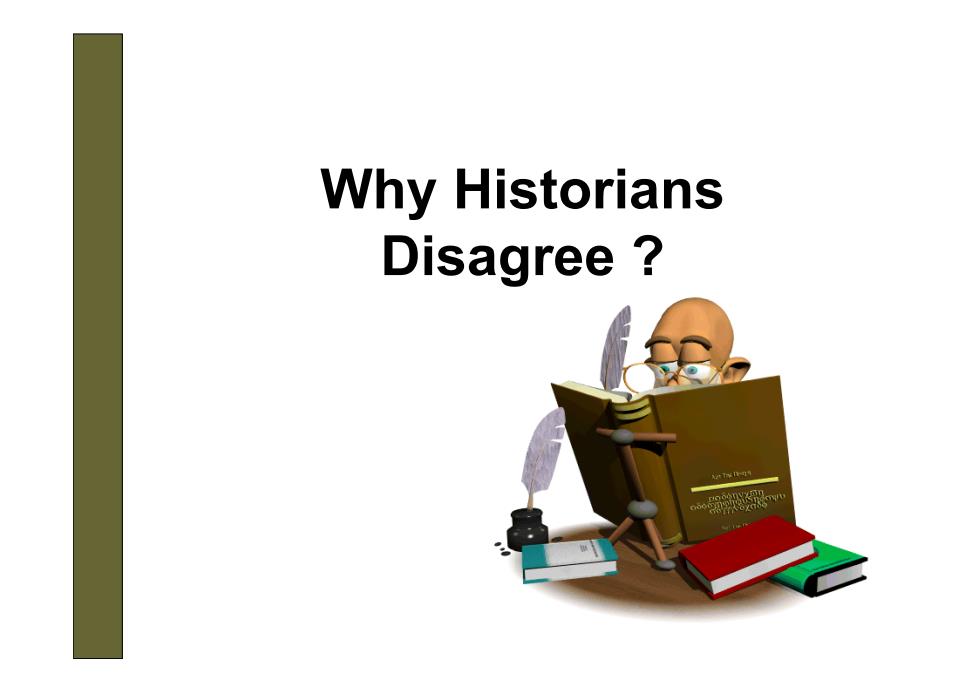
Why Historians Disagree
Why Historians Disagree ?
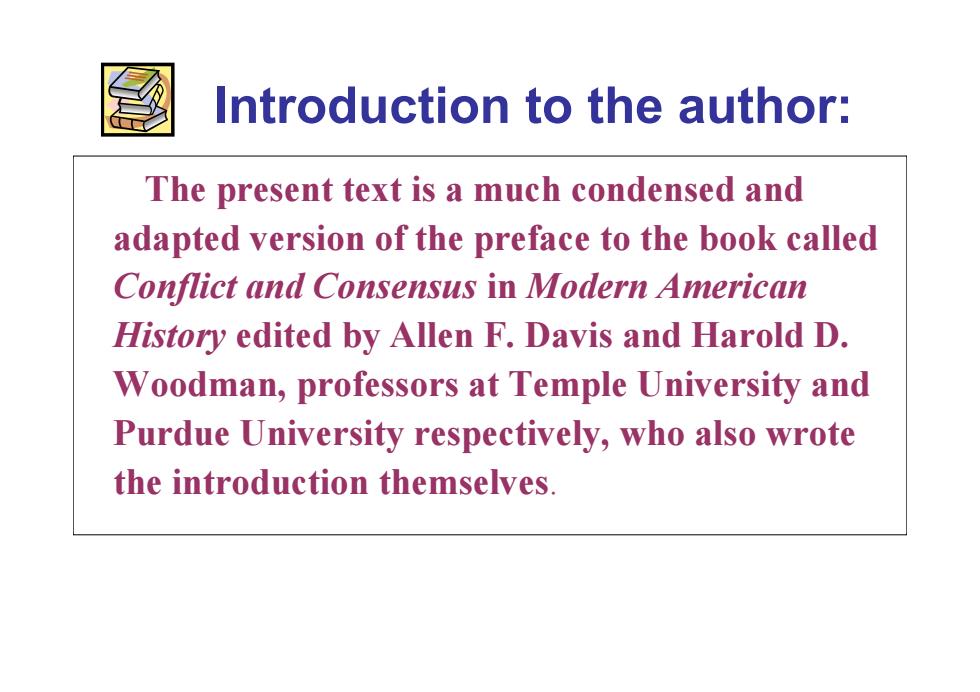
Introduction to the author: The present text is a much condensed and adapted version of the preface to the book called Conflict and Consensus in Modern American History edited by Allen F.Davis and Harold D. Woodman,professors at Temple University and Purdue University respectively,who also wrote the introduction themselves
Introduction to the author: The present text is a much condensed and adapted version of the preface to the book called Conflict and Consensus in Modern American History edited by Allen F. Davis and Harold D. Woodman, professors at Temple University and Purdue University respectively, who also wrote the introduction themselves
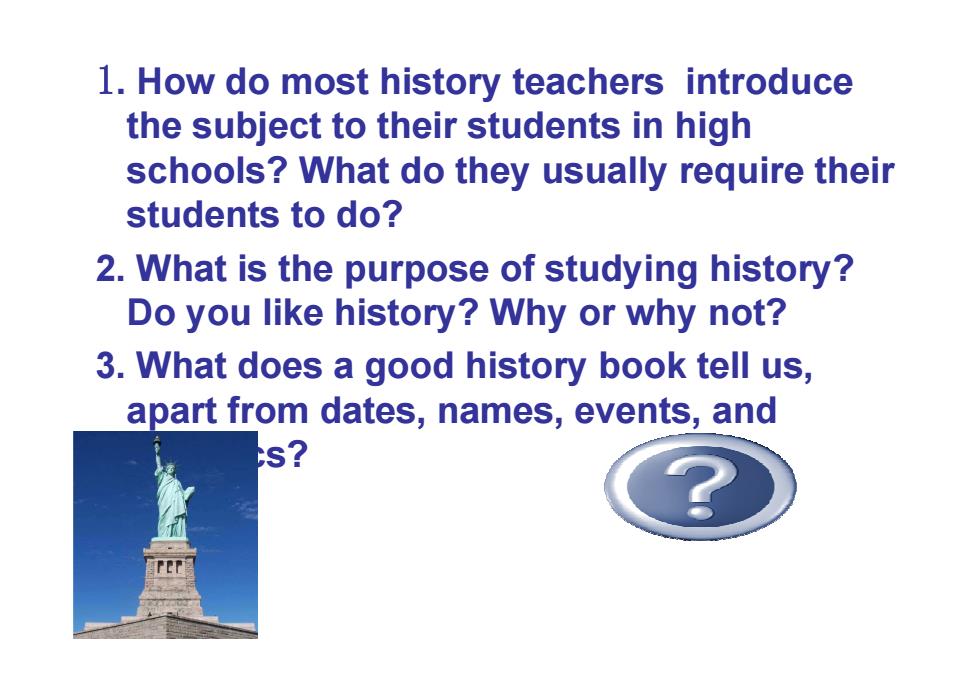
1.How do most history teachers introduce the subject to their students in high schools?What do they usually require their students to do? 2.What is the purpose of studying history? Do you like history?Why or why not? 3.What does a good history book tell us, apart from dates,names,events,and ts?
1. How do most history teachers introduce the subject to their students in high schools? What do they usually require their students to do? 2. What is the purpose of studying history? Do you like history? Why or why not? 3. What does a good history book tell us, apart from dates, names, events, and statistics?
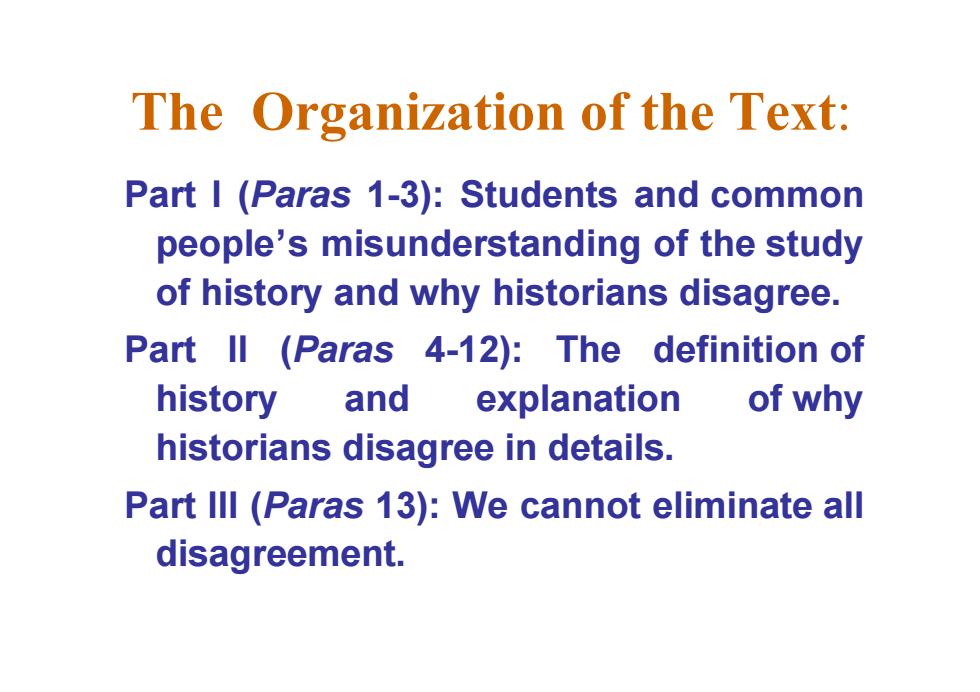
The Organization of the Text: Part I(Paras 1-3):Students and common people's misunderstanding of the study of history and why historians disagree. Part ll (Paras 4-12):The definition of history and explanation of why historians disagree in details. Part Ill (Paras 13):We cannot eliminate all disagreement
The Organization of the Text : Part I (Paras 1-3): Students and common people’s misunderstanding of the study of history and why historians disagree. Part II (Paras 4-12): The definition of history and explanation of why historians disagree in details. Part III (Paras 13): We cannot eliminate all disagreement
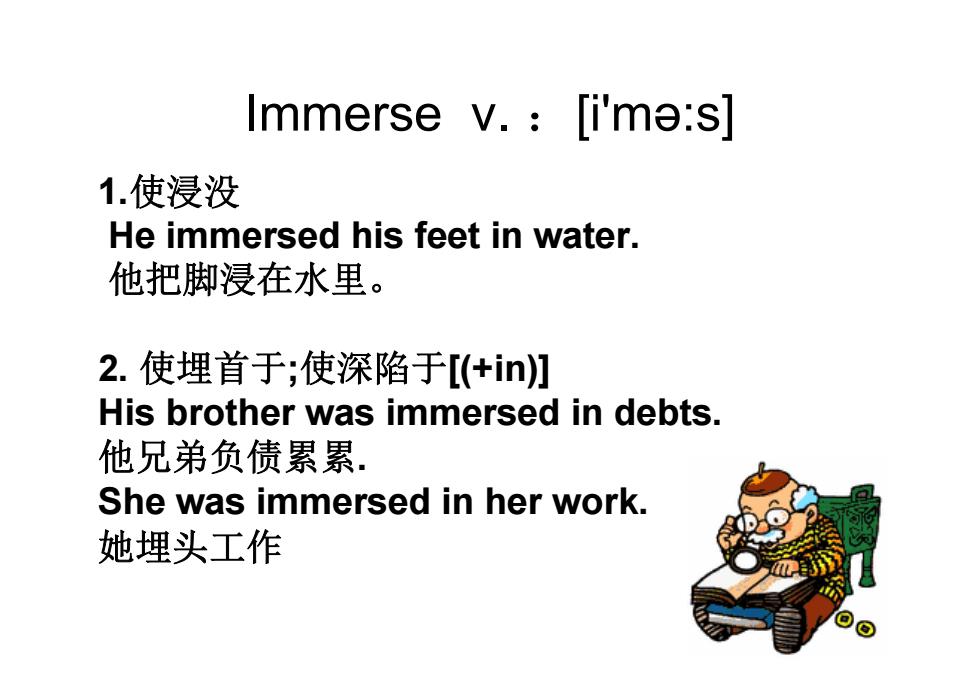
Immerse v.[i'me:s] 1.使浸没 He immersed his feet in water. 他把脚浸在水里。 2.使埋首于;使深陷于[(+in)] His brother was immersed in debts. 他兄弟负债累累 She was immersed in her work. 她埋头工作
Immerse v. :[i'mə:s] 1.使浸没 He immersed his feet in water. 他把脚浸在水里。 2. 使埋首于;使深陷于[(+in)] His brother was immersed in debts. 他兄弟负债累累. She was immersed in her work. 她埋头工作
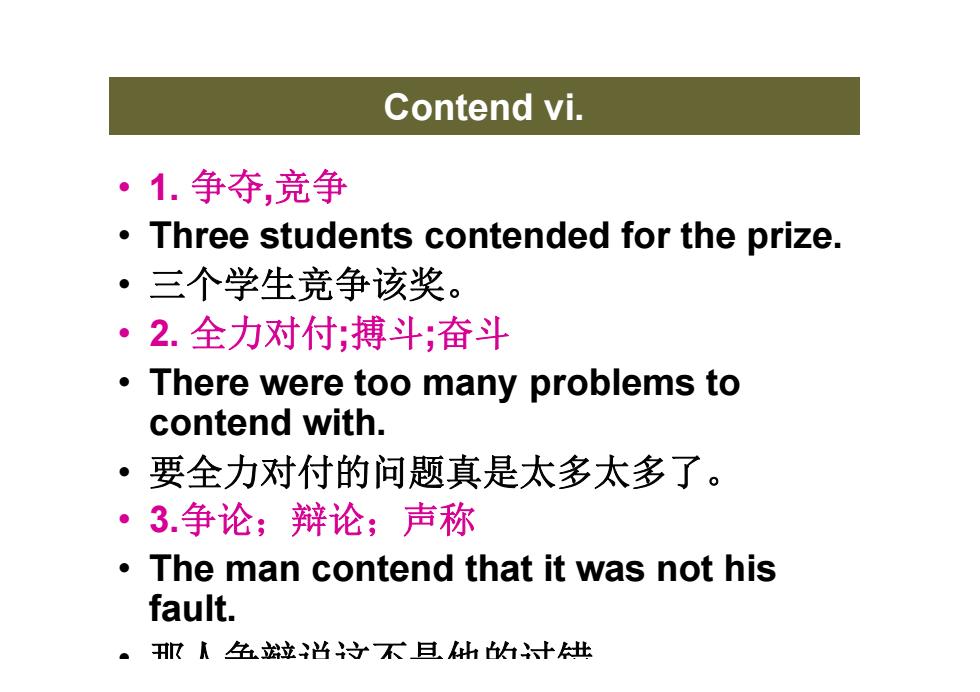
Contend vi. ·1.争夺,竞争 Three students contended for the prize. ·三个学生竞争该奖。 ·2.全力对付;搏斗;奋斗 There were too many problems to contend with. ·要全力对付的问题真是太多太多了。 ·3.争论;辩论;声称 The man contend that it was not his fault. 。取《名拉出立不旦h十进
Contend vi. • 1. 争夺,竞争 • Three students contended for the prize. • 三个学生竞争该奖。 • 2. 全力对付;搏斗;奋斗 • There were too many problems to contend with. • 要全力对付的问题真是太多太多了。 • 3.争论;辩论;声称 • The man contend that it was not his fault. • 那人争辩说这不是他的过错
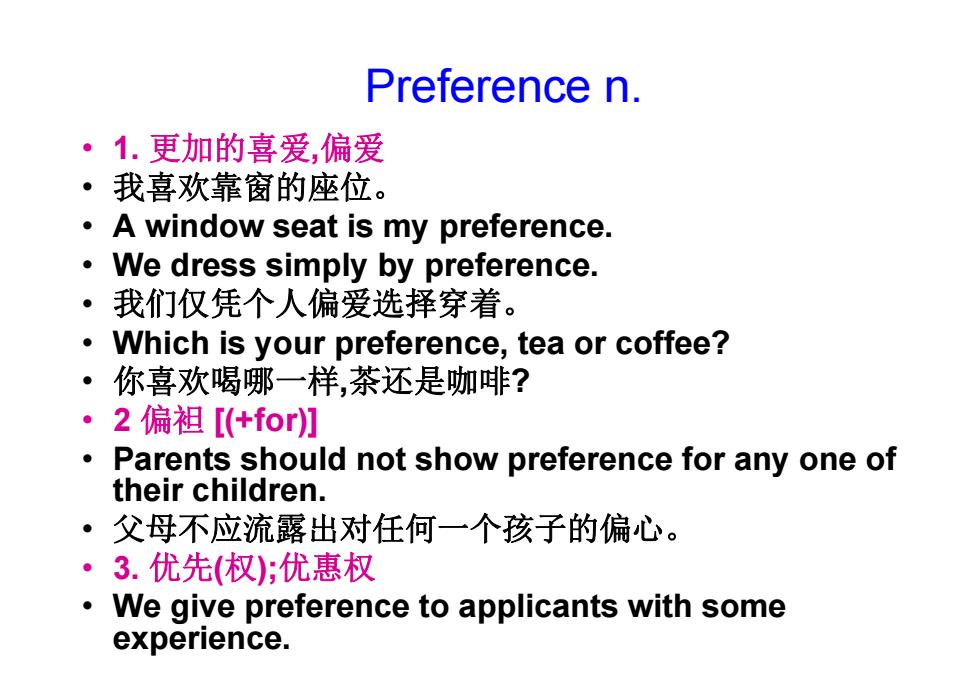
Preference n. ·1.更加的喜爱,偏爱 ·我喜欢靠窗的座位。 A window seat is my preference. We dress simply by preference. ·我们仅凭个人偏爱选择穿着。 Which is your preference,tea or coffee? ·你喜欢喝哪一样,茶还是咖啡? ·2偏祖[(+for] Parents should not show preference for any one of their children. ·父母不应流露出对任何一个孩子的偏心。 ·3.优先(权);优惠权 We give preference to applicants with some experience
Preference n. • 1. 更加的喜爱,偏爱 • 我喜欢靠窗的座位。 • A window seat is my preference. • We dress simply by preference. • 我们仅凭个人偏爱选择穿着。 • Which is your preference, tea or coffee? • 你喜欢喝哪一样,茶还是咖啡? • 2 偏袒 [(+for)] • Parents should not show preference for any one of their children. • 父母不应流露出对任何一个孩子的偏心。 • 3. 优先(权);优惠权 • We give preference to applicants with some experience. •
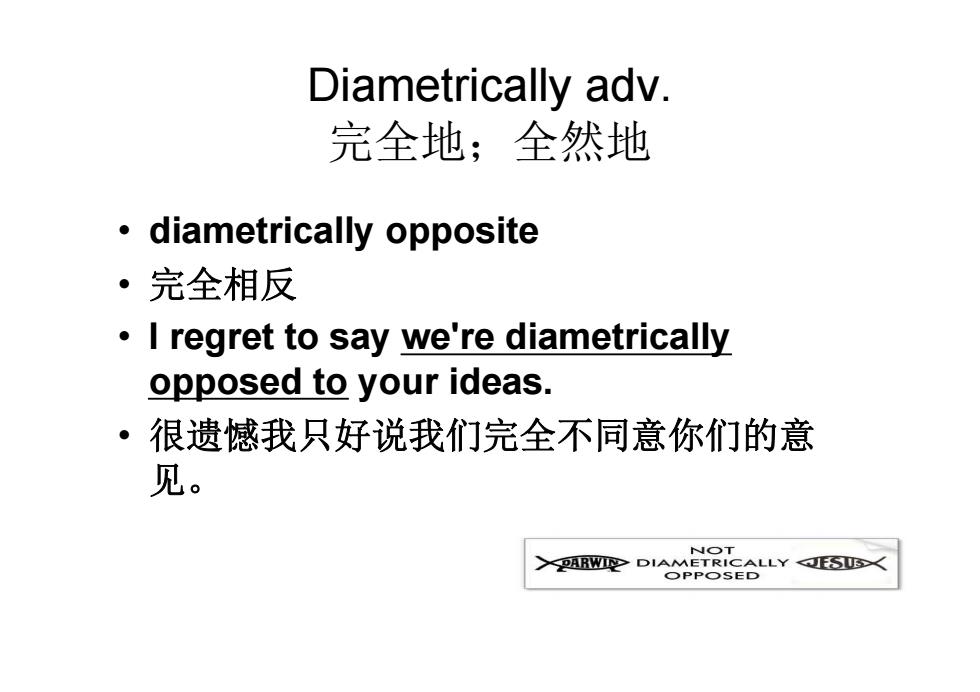
Diametrically adv. 完全地;全然地 diametrically opposite 。 完全相反 I regret to say we're diametrically opposed to your ideas. 。 很遗憾我只好说我们完全不同意你们的意 见。 NOT XPARWID DIAMETRICALLY FSI OPPOSED
Diametrically adv. 完全地;全然地 • diametrically opposite • 完 全 相 反 • I regret to say we're diametrically opposed to your ideas. • 很 遗 憾 我 只 好 说 我 们 完 全 不 同 意 你 们 的 意 见
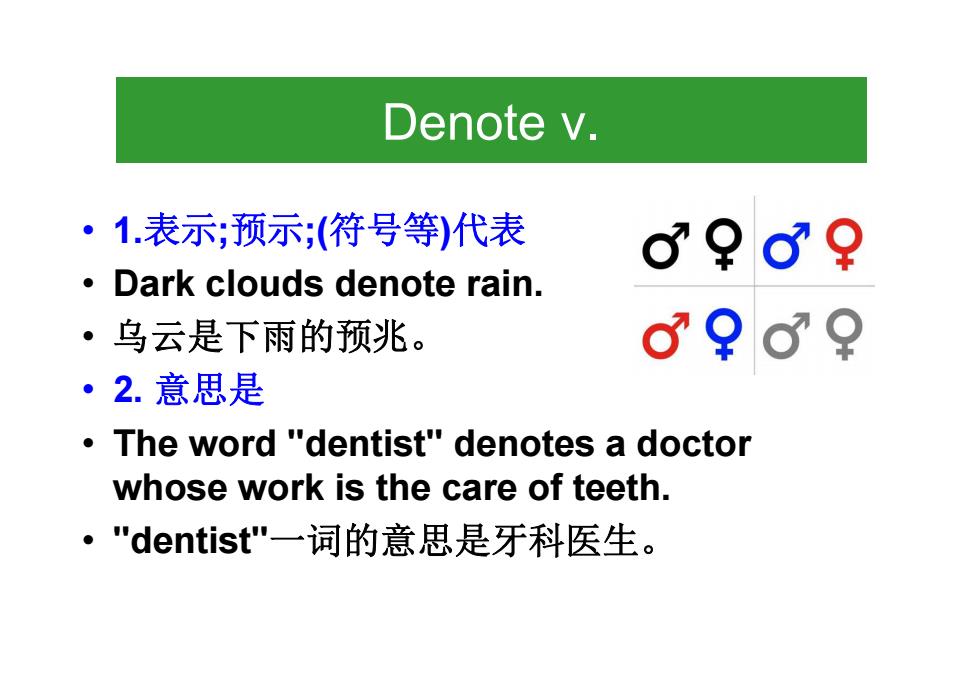
Denote v. ·1.表示;预示;(符号等)代表 Dark clouds denote rain. ·乌云是下雨的预兆。 ·2.意思是 The word "dentist"denotes a doctor whose work is the care of teeth. ·"dentist'"一词的意思是牙科医生
Denote v. • 1.表示;预示;(符号等)代表 • Dark clouds denote rain. • 乌云是下雨的预兆。 • 2. 意思是 • The word "dentist" denotes a doctor whose work is the care of teeth. • "dentist"一词的意思是牙科医生
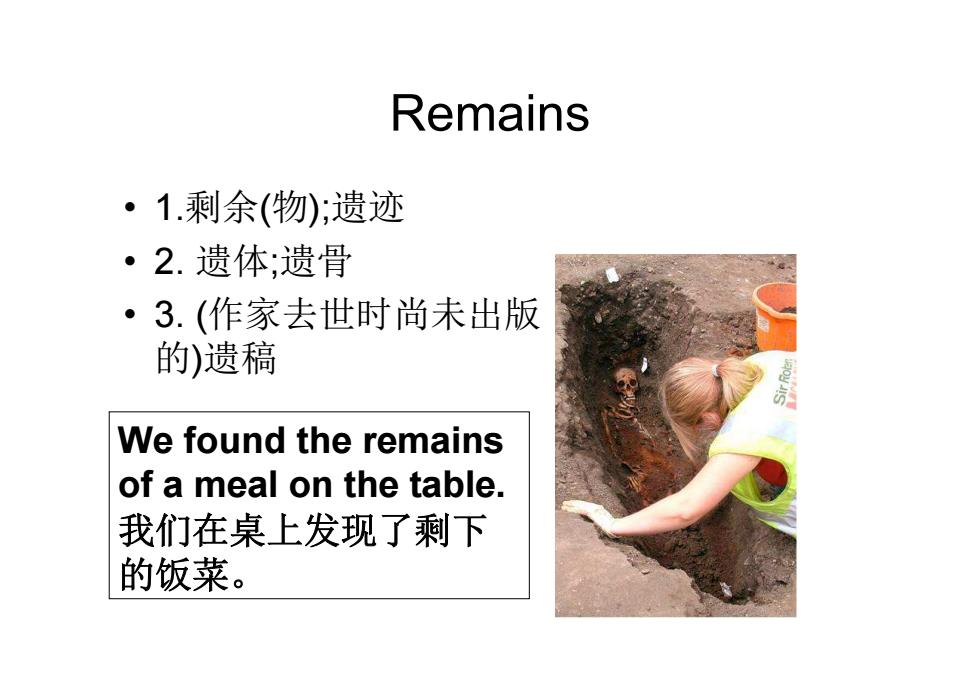
Remains ·1.剩余(物);遗迹 ·2.遗体;遗骨 ·3.(作家去世时尚未出版 的)遗稿 We found the remains of a meal on the table. 我们在桌上发现了剩下 的饭菜
Remains • 1.剩余(物);遗迹 • 2. 遗体;遗骨 • 3. (作家去世时尚未出版 的)遗稿 We found the remains of a meal on the table. 我们在桌上发现了剩下 的饭菜